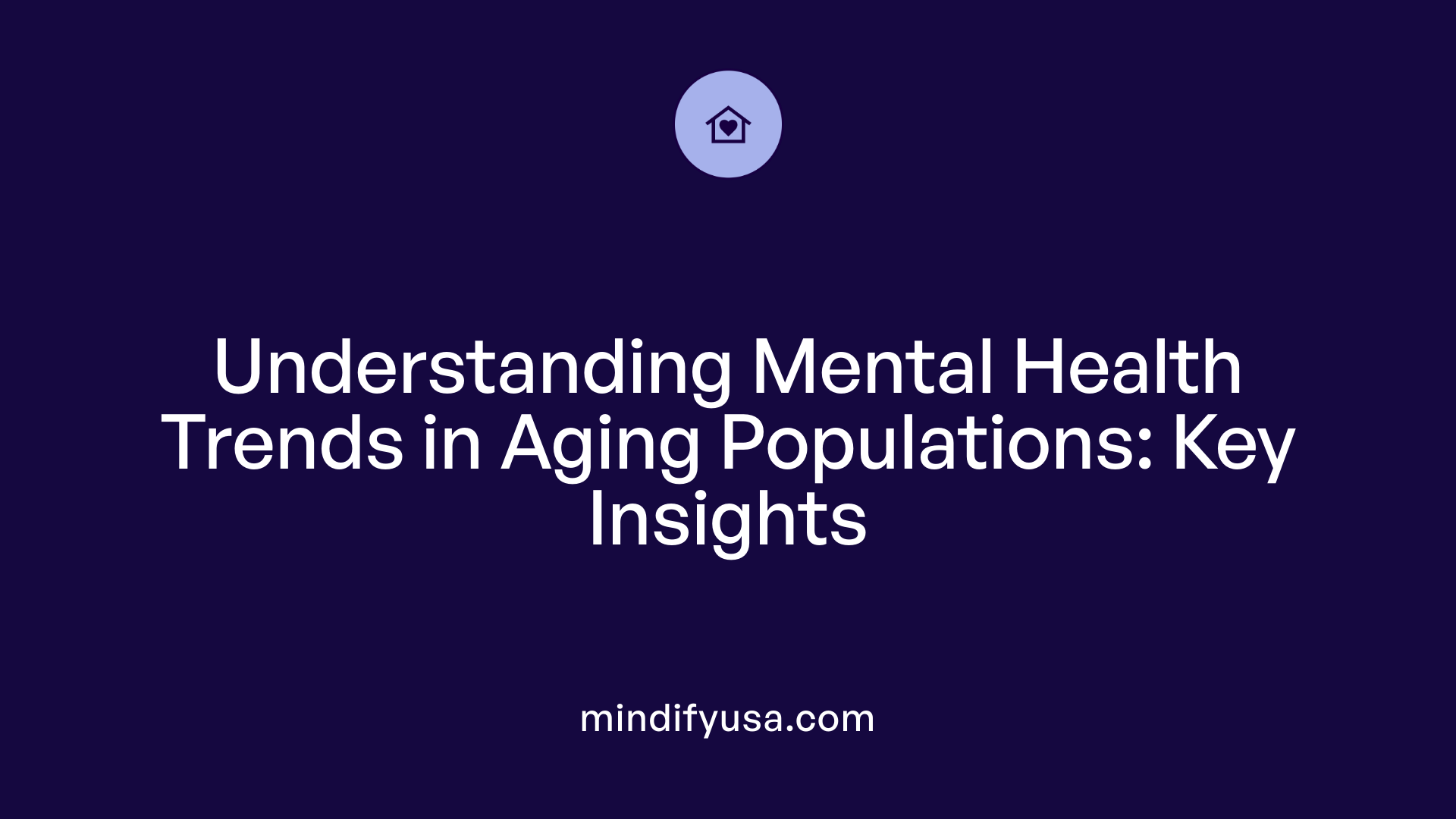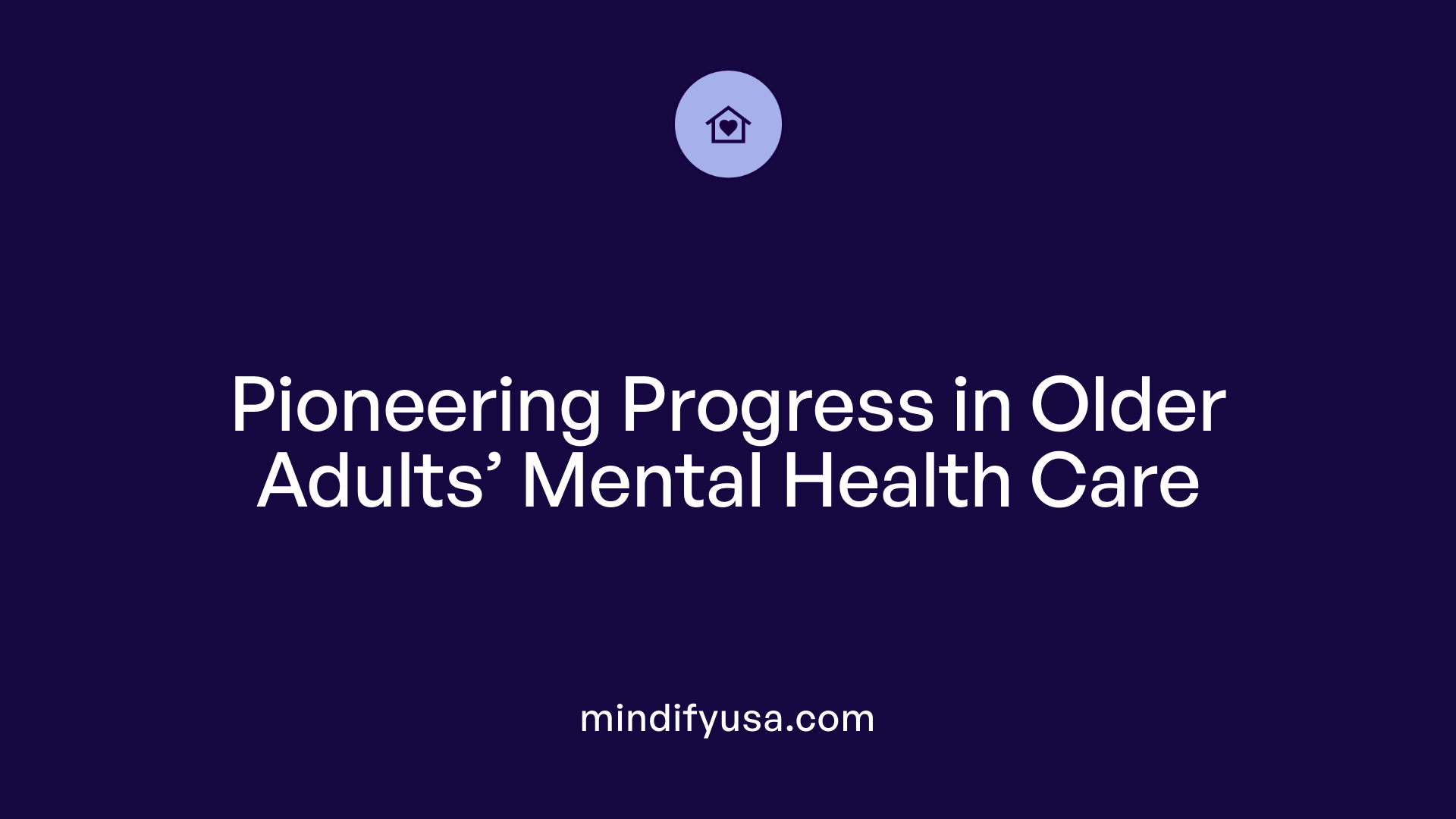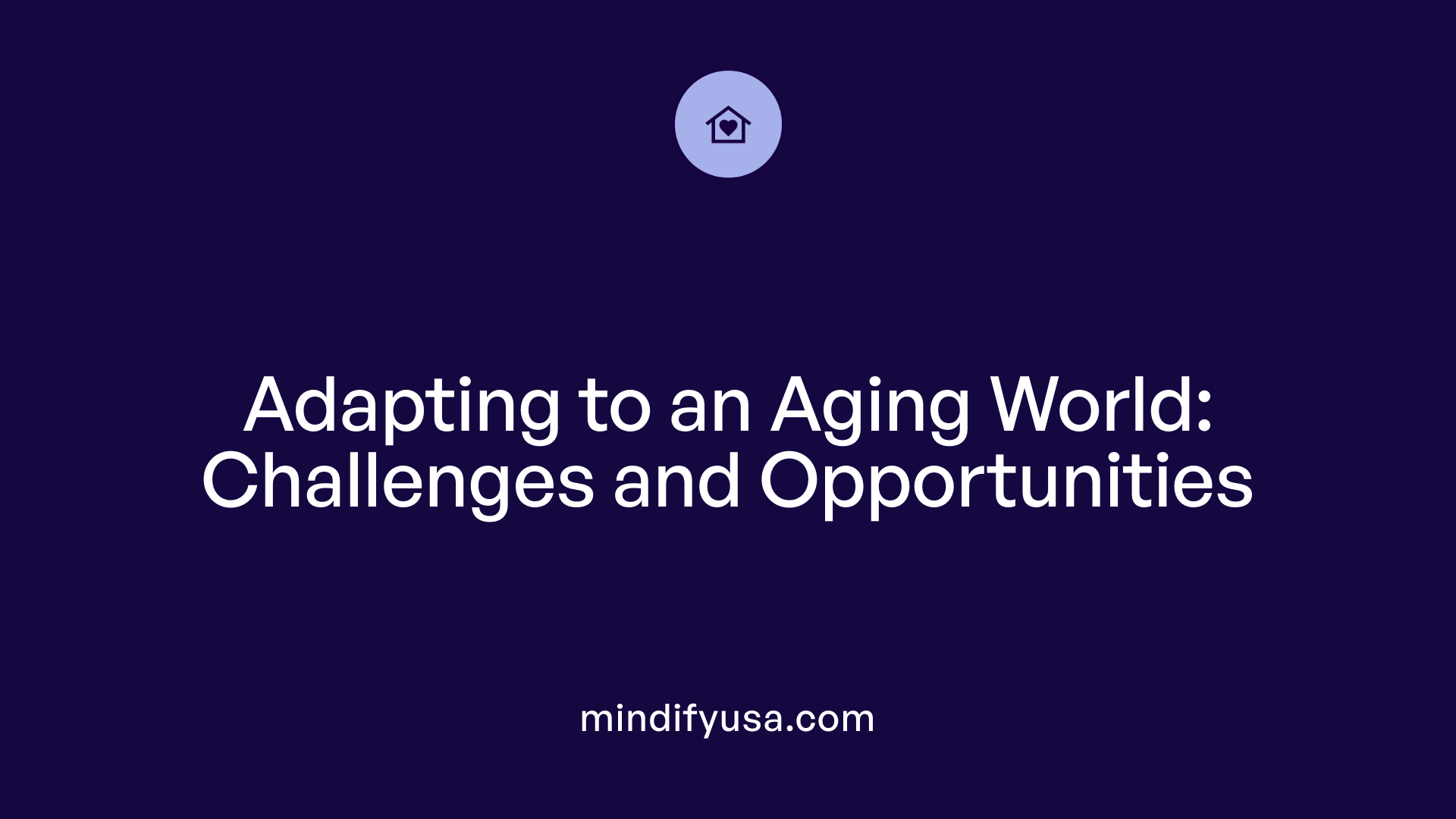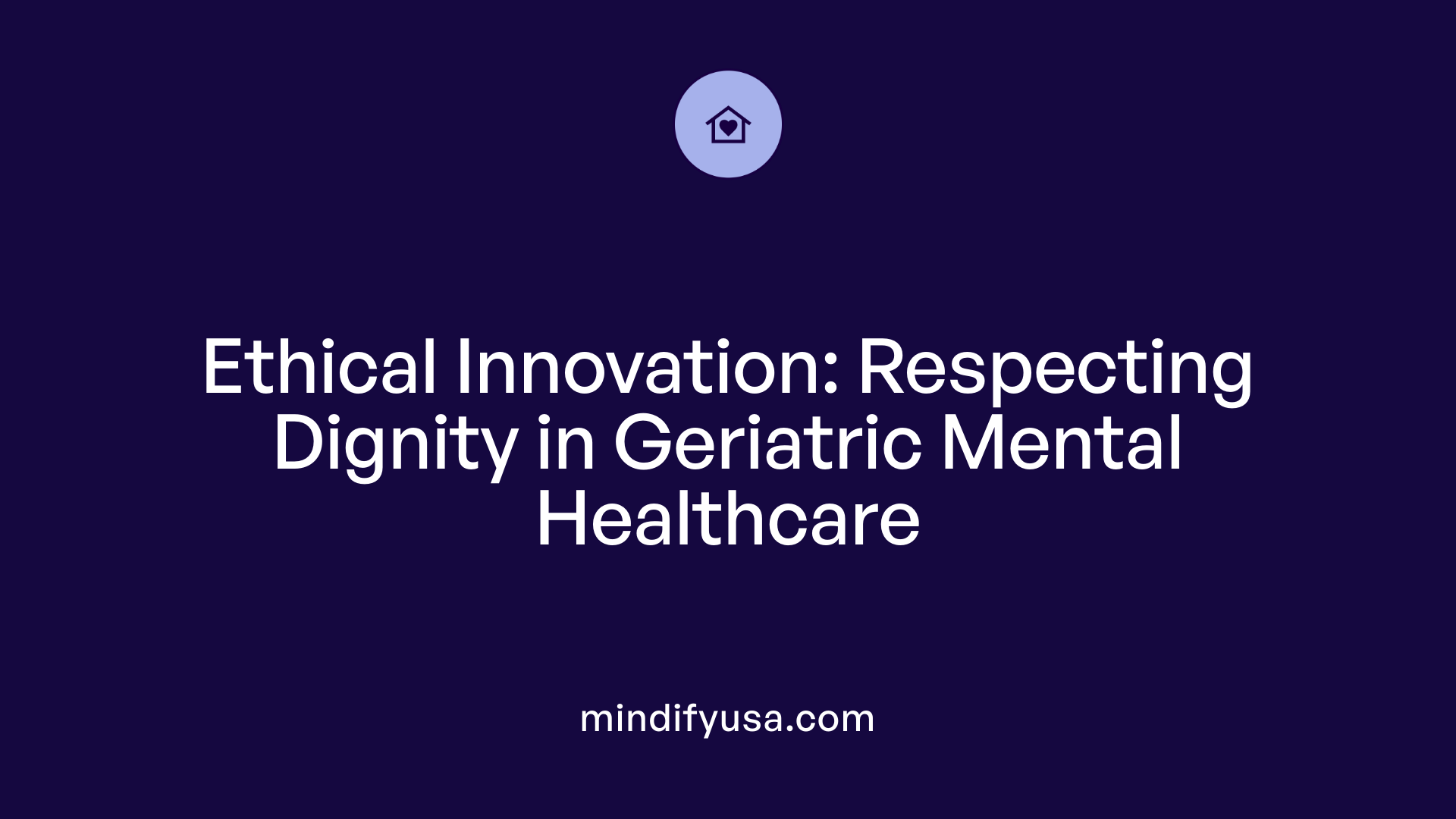Understanding the Growing Importance of Geriatric Mental Health
As the global population ages rapidly, the mental health needs of older adults are becoming increasingly complex and pressing. By 2030, one in six people worldwide will be aged 60 or older, a demographic shift that poses significant challenges and opportunities for healthcare systems, policymakers, and communities. This article explores the changing landscape of mental health in aging populations, examining prevalence, challenges, advances, and innovative strategies designed to promote well-being and dignity in later life.
The Demographics and Epidemiology of Mental Disorders in Older Adults

What is the epidemiology of mental health disorders among the elderly, and what are the risk factors?
The mental health landscape for older adults shows a noteworthy prevalence of conditions such as depression, anxiety, dementia, and other neurocognitive disorders. Approximately 14% of adults aged 60 and over live with mental disorders, including common issues like depression, which affects up to 28.3% in some populations, and anxiety, impacting around 12%. Dementia-related disorders, notably Alzheimer's disease, are also on the rise, affecting over 5.7 million in the US alone, with projections indicating that this number could triple by 2050.
The occurrence of these disorders varies depending on the care setting; for instance, higher severity and co-occurrence rates are often observed among nursing home residents. Several factors contribute to the development and exacerbation of mental health issues in the elderly. Social isolation and loneliness are significant risk elements, affecting about a quarter of older adults and increasing the likelihood of depression and cognitive decline.
Chronic physical conditions, such as arthritis, diabetes, cardiovascular diseases, and neurological illnesses like Parkinson’s, can worsen mental health symptoms. Life stressors like bereavement, income reduction, or loss of purpose, as well as experiences of abuse—whether physical, psychological, financial, or sexual—also heighten risk.
Age-related physiological changes, including sensory deficits and neurodegeneration, can impair emotional regulation and memory, further contributing to mental health challenges. Gender plays a role, with women experiencing higher rates of depression. Additionally, disparities in access to mental health care, fueled by stigma, underinsurance, and structural barriers, result in many older adults remaining untreated.
The COVID-19 pandemic has acuteished the issue, revealing and worsening existing gaps in mental health services for older populations. Overall, mental health disorders significantly impact morbidity, mortality, and quality of life among older adults worldwide, emphasizing the need for targeted prevention, early diagnosis, and comprehensive treatment approaches.
How demographic shifts influence mental health services
Globally, the proportion of older adults is expanding rapidly, driven by increased longevity and the aging of the baby boomer generation. By 2030, an estimated one in six people worldwide will be aged 60 or older, with the US experiencing similar trends as the population over 65 approaches 82 million.
This demographic shift poses substantial challenges for mental health services, which must adapt to meet the increasing demand. The fastest-growing age segment will be those over 85, tripling by 2050 to over 17 million. Older adults today often experience multiple chronic conditions—88% have at least one, and 60% have two or more—leading to complex healthcare needs.
Resource limitations, workforce shortages—projected to leave millions of healthcare providers short—and technological lag hinder effective service delivery. Care fragmentation and socioeconomic disparities further exacerbate health outcomes, necessitating integrated, accessible mental health care options.
In conclusion, the rising elderly population underscores the urgent need for expanded, tailored mental health support systems that prioritize early detection, address social determinants, and incorporate innovative approaches like telepsychiatry and community-based programs to promote well-being and independence among older adults.
The Intersection of Chronic Illness, Cognitive Decline, and Mental Health
How do mental health needs change with aging?
As individuals grow older, their mental health requirements often become more intricate, influenced by physiological, psychological, and social transformations. Chronic health conditions like arthritis, diabetes, and cardiovascular diseases are common, and these physical ailments often coexist with mental health issues such as depression and anxiety. The experience of loss, bereavement, and social isolation are frequent stressors that can exacerbate existing mental health conditions or trigger new ones.
Older adults are particularly vulnerable to these issues because mental health problems often go undiagnosed or untreated due to overlapping symptoms with physical illnesses or age-related misperceptions. This underdiagnosis can significantly diminish quality of life, accelerate cognitive decline, and increase mortality risk, including a higher propensity for suicide among older men.
Strategies to meet these evolving needs include early detection through screening programs, community-based support systems, social engagement activities, and creating environments that foster mental well-being. Tailored interventions that acknowledge the unique challenges of aging are essential for promoting mental health and maintaining independence among older adults.
Neurocognitive disorders like dementia and Alzheimer’s disease
Neurocognitive disorders such as dementia, including Alzheimer’s disease, are among the most pressing mental health concerns for aging populations. These conditions involve progressive decline in cognitive functions like memory, decision-making, and emotional regulation, heavily impacting individuals' autonomy and quality of life. It is estimated that over 5.7 million Americans have Alzheimer’s disease alone, with future projections reaching 14 million by 2050.
Comorbidity with physical health conditions
The relationship between mental health and physical health in older adults is complex. Conditions like stroke, Parkinson’s disease, and arthritis often co-occur with neurocognitive disorders, compounding functional impairments. For example, depression is common among those with dementia, and conversely, depression can increase the risk of developing dementia.
Physical health issues not only influence cognitive decline but also affect emotional well-being, further complicating diagnosis and treatment. Multidisciplinary approaches that address both mental and physical health are vital for managing these overlapping conditions effectively.
Role of physical health in mental well-being
Physical health profoundly impacts mental well-being. Regular exercise, adequate nutrition, and management of chronic diseases help improve mood, cognitive function, and overall quality of life. Conversely, decline in physical abilities can lead to social isolation and loss of independence, which are significant risk factors for depression and anxiety.
In conclusion, understanding the intertwined nature of physical health, cognitive decline, and mental health is crucial for developing comprehensive, patient-centered care strategies. These approaches should include early diagnosis, personalized treatment plans, and social support systems to foster successful aging and mental well-being.
Advances in Research and Policy for Older Adults’ Mental Health

What are recent advances and policy developments related to mental health and aging?
Recent progress in understanding and supporting mental health in older populations has led to significant improvements in screening, diagnosis, and treatment approaches. Newer screening tools are more sensitive in detecting early signs of conditions like dementia and depression, enabling earlier intervention which can enhance quality of life.
Biomarker research is advancing rapidly, with the goal of developing personalized medicine for age-related mental disorders. These biomarkers help identify individuals at higher risk for conditions such as Alzheimer’s disease, paving the way for tailored treatments targeting specific biological pathways.
On the policy front, numerous initiatives focus on integrating mental health care within broader healthcare systems. Efforts emphasize the importance of mental health services in primary care, making treatment more accessible to older adults. Expansion of community-based programs, telepsychiatry, and digital health tools are key strategies to reach underserved populations, especially those facing mobility issues or residing in rural areas.
Internationally, organizations like the World Health Organization (WHO) have launched projects such as the Decade of Healthy Ageing to promote policies that foster healthy and active aging. These initiatives aim to reduce social disparities, combat ageism, and improve mental health literacy.
In the United States, policy reforms include expanding Medicare and Medicaid coverage to encompass comprehensive mental health services. Rebalancing efforts aim to shift resources from institutional care to community-based options, supporting independence and social integration.
Looking ahead, the focus is on developing personalized, prevention-oriented care models. Incorporating emerging technologies like digital therapeutics and remote monitoring will help manage chronic mental health conditions effectively.
Overall, these advances and policy shifts underscore a holistic approach, emphasizing early detection, tailored treatments, social support, and technological innovation to meet the mental health needs of the aging population.
Evolving Strategies and Innovations in Mental Health Care Delivery

How are mental health care strategies evolving to better serve older adults?
The approach to mental health care for older adults is undergoing significant change, aiming to make services more accessible, personalized, and holistic. One major development is the integration of mental health services into primary healthcare settings, ensuring that mental health screening and treatment are part of regular medical care.
In addition, technology plays a vital role. Telepsychiatry and digital health tools have expanded access, especially for older individuals with mobility challenges or those living in rural areas. These digital solutions allow regular check-ins, therapy sessions, and mental health monitoring without the need for physical visits.
Community-based programs and multidisciplinary teams are also expanding. These approaches emphasize social support, physical activity, and community engagement, which are crucial for combatting social isolation and loneliness—both major risk factors for mental health conditions in later life.
Evidence-based psychotherapies like cognitive-behavioral therapy (CBT), interpersonal therapy (IPT), and problem-solving therapy are increasingly being used alongside medication to improve outcomes. Innovative models like collaborative care—bringing together primary care providers, mental health specialists, and social workers—aim to provide seamless, coordinated treatment.
Looking ahead, early diagnosis and biomarker research are expected to facilitate personalized medicine tailored to individual needs. Support for caregivers, reduction of stigma, and tackling social determinants such as ageism and social exclusion are also critical. Overall, these evolving strategies reflect a comprehensive effort to meet the complex mental health needs of our aging populations.
The Impact of Demographic Shifts on Healthcare and Mental Health Services
 The world is experiencing a significant demographic transformation, with the global population aged 60 years and older expected to reach over 2.1 billion by 2050. This rapid aging trend increases the demand for specialized healthcare and mental health services tailored to older adults.
The world is experiencing a significant demographic transformation, with the global population aged 60 years and older expected to reach over 2.1 billion by 2050. This rapid aging trend increases the demand for specialized healthcare and mental health services tailored to older adults.
As the number of elderly individuals grows, so do their needs for mental health support. Conditions such as depression, anxiety, dementia, and neurocognitive disorders are becoming more prevalent within this age group. Factors like social isolation, bereavement, loss of purpose, and physical health challenges often contribute to mental health decline.
Many older adults face these issues without adequate diagnosis or treatment, which can lead to diminished quality of life, increased disability, and higher risk of mortality, including suicide—particularly among men over 70. The surge in the older population necessitates the expansion of mental health services, development of age-specific interventions, and policies that promote social inclusion and mental well-being.
Healthcare systems face mounting pressures from these demographic changes. The increase in age-related illnesses, combined with longer life spans, elevates healthcare costs significantly. For instance, Medicare spending is expected to rise sharply, driven by higher utilization rates and complex care needs.
In addition to the rising demand, workforce shortages further complicate the delivery of adequate mental health care. Projections estimate shortages of up to 139,000 physicians and 1.2 million nurses by 2030, making it difficult to meet the growing needs of the aging population.
Service fragmentation poses another challenge, often resulting from uncoordinated care and disparities in access. Vulnerable groups, including those in rural or underserved areas, are particularly at risk of receiving inadequate support. These issues underscore the importance of integrated, community-based approaches and leveraging technology such as telepsychiatry to improve accessibility.
Addressing the mental health needs of an aging society requires comprehensive strategies, including workforce expansion, policy reforms, community support programs, and innovations in digital health. The goal must be to provide accessible, effective, and holistic care that preserves dignity, independence, and quality of life for older adults.
| Aspect | Challenges | Proposed Solutions |
|---|---|---|
| Population Growth | Rapid increase in aged population | Enhance aging-specific health policies |
| Healthcare Demand | Rising costs and service needs | Develop cost-effective, preventive care models |
| Workforce Shortages | Insufficient providers in geriatrics | Invest in training and expand telehealth |
| Service Fragmentation | Uncoordinated care delivery | Implement integrated, team-based approaches |
| Social Factors | Isolation and stigma | Promote social programs and reduce ageism |
Ethical Considerations and Healthcare Innovations
 As the field of geriatric mental health evolves, addressing ethical issues becomes increasingly important. Respecting older adults' autonomy and ensuring informed consent are fundamental, especially when introducing new treatments or digital interventions. Ageism and social stigma often act as barriers to accessing quality mental health care, emphasizing the need for respectful, person-centered approaches.
As the field of geriatric mental health evolves, addressing ethical issues becomes increasingly important. Respecting older adults' autonomy and ensuring informed consent are fundamental, especially when introducing new treatments or digital interventions. Ageism and social stigma often act as barriers to accessing quality mental health care, emphasizing the need for respectful, person-centered approaches.
Modern healthcare innovations like digital therapeutics, telepsychiatry, and AI-enabled monitoring systems offer promising avenues for early detection and personalized treatment. These tools can improve care delivery, especially in rural or underserved areas, but also raise concerns about privacy, data security, and digital literacy among older populations.
Promoting positive aspects of aging—such as resilience, wisdom, and prosocial behaviors—can help combat negative stereotypes and foster mental well-being. A holistic approach that combines medical treatment with social engagement, community support, and family involvement is essential.
In addition, considerations around polypharmacy, advance directives, and ensuring equitable access to care are crucial for safe and respectful treatment. Developing multidisciplinary, team-based models and leveraging technology thoughtfully can support autonomy and safety, ultimately enhancing quality of life.
Balancing innovation with ethical responsibility is vital to creating a healthcare system that respects older adults' dignity while advancing mental health support.
Promoting Mental Health and Well-being in an Aging World
The dynamic landscape of mental health in aging populations demands proactive, integrated, and innovative approaches. Emphasizing early detection, community involvement, and technological advances, stakeholders can better meet the diverse needs of older adults. Addressing social determinants such as stigma, social isolation, and workforce shortages is essential for equitable care. Through policy reforms, research, community programs, and ethical practice, societies worldwide can foster environments where aging individuals thrive with dignity and resilience. As demographic shifts continue, a collective effort is vital to ensure mental health care keeps pace with the evolving needs of our growing older population.
References
- Mental health care for older adults: recent advances and ...
- Mental health of older adults
- State TA: Supporting the Mental Health Needs of Older Adults
- Mental Health & Aging Facts | Psychiatry
- Why Should We Care About the Mental Health of Older Adults?
- Healthcare on the brink: navigating the challenges of an ...
- The State of Mental Health Care for Older Adults
- Unique Mental Health Needs of Aging Populations and the ...
- Mental health of older adults





































































































